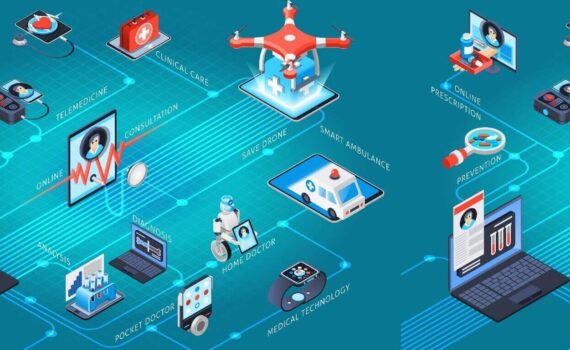Mobile App Development Trends in Pharmaceutical Industry.
1. Augment Reality And Virtual Reality
Augment reality is important for all the developers alike. Augmented and Virtual reality has a lot to contribute to the pharmaceutical industry, as companies struggle to engage doctors and research timelines spin into a whirlwind of more and more studies. The ability of this technology to create a captivating virtual world with minute details, Augmented and Virtual reality are promising technologies that can cater to a wide range of needs of the pharmaceutical industry.
These technologies can be expanded for drug-target interaction prediction studies. Similarly virtual reality can increase the efficiency of the pre-development phases of medicine by enabling scientists to better visualize the interactions and thus redesign and re-engineer molecules according to site specifications.
Visualizing things in a virtual ecosystem is the new way for the clients to perceive the business, which Apple is already doing by integrating the ARKIt in its app development technique.
2. 3D-Printed Drugs
Once 3D printing was just a concept of sci-fi fantasies. But since 2015 this concept has come to the light and has implemented. Major pharma companies such as Aprecia Pharmaceuticals developed Zipdose developed Zipdose, patented technology for 3D printing drugs to enable high-dose medications in a rapidly disintegrating form, then produced Spritam, which treats Epilepsy. This was approved by the FDA and it was the world’s first 3D printed drug. It will likely completely transform how the pharmaceutical industry operates, in terms of its supply chain as this manufacturing method gains popularity.
In ten years’ time hospitals and pharmacies could potentially print the pills that they need in-house, also the University College of London is testing ways to print medicines in fun shapes for kids making it easier for them to take and can make it a potential commercial goldmine.
3. Digitization of Medicine through Healthcare Mobile Apps
It is not enough anymore for pharma companies around the world if they are to only produce and develop drugs, they have to go beyond the physical appearance of medicines itself and offer a complete package. These are called the “around the pill” digital offerings already: devices or services that could be prescribed by a doctor or bundled with a drug in digital health mobile apps.
Fitness apps for chronic diseases, locating free health care clinics and hospitals, ordering drugs via e-commerce apps, cross-checking clash by multiple medications, social network connecting patients apps, these are already popular in the app stores.
Mobile apps that will connect patients with health insurance companies can eliminate the long process of document verification activities and authentication. In this process, insurance companies can decide whether that particular bill goes under insurance coverage or not once they get the prescription and other medical documents of their clients through the mobile app.
Hence, healthcare apps are the next big thing for pharmaceutical industries; more digital apps are coming with the rising of new technologies.
4. Artificial Intelligence and Machine Learning
Core machine learning is a great tool for professionals, Core ML acts as the foundation for domain-specific functionalities especially for iOS app developers. It supports the vision for image analysis in addition to appearing as the foundation for natural language processing, when implemented on devices, the functionality of Core ML is optimized for the performance. To offer more security the privacy of user-data is additionally added.
AI and ML are undoubtedly the next big thing for the pharmaceutical industry. For conducting repetitive tasks in the healthcare industry such as analysis of healthcare systems to identify errors or inefficiencies, data entry, lab test analyses, data management, medical consultations by AI-based apps, medication management that monitored by an AI-based system, etc AI is already being used. In disease identification and diagnosis, radiology and radiotherapy planning, clinical trial research, personalized medicine, rare disease identification, and new drug invention, etc ML is also being used
Most, if not all, pharmaceutical R&D operations AI and ML are expected to be integrated. Theoretically this should improve the drug development success rate and streamline R&D efforts. Furthermore, AI may, in theory, help accurately identify the subset of patients who will benefit from a particular drug. This could reduce the failure rate substantially and ensure a successful and quick launch.
5. Enhanced Security Protocols
The primary trend of the mobile application is the security protocols. We all know about the security algorithms of Apple. It’s known for its hardcore security layers and uncompromising policies that don’t let anyone breach into the Apple devices.
Organizations must move from simply monitoring and collecting data to understanding it and visualizing new behaviors and anomalies to deal with these complex and ever-changing array of threats. As an example, to better understand risks and to detect attacks, organizations will increasingly turn to data platform technologies that provide data access and aggregation via services. Secure access to large volumes of fast-changing data that many companies are unable to manage in house will be handled by the data platform.
In the future, mobile applications will need to overcome the challenge to communicate and exchange information seamlessly with connected objects. It is, thus, vital for any business to update with the latest mobile development technologies.
REFERENCE:
https://medium.com/brainstation23/pharmaceutical-industry-top-7-technologies-to-reshape-the-future-ebf167340985





